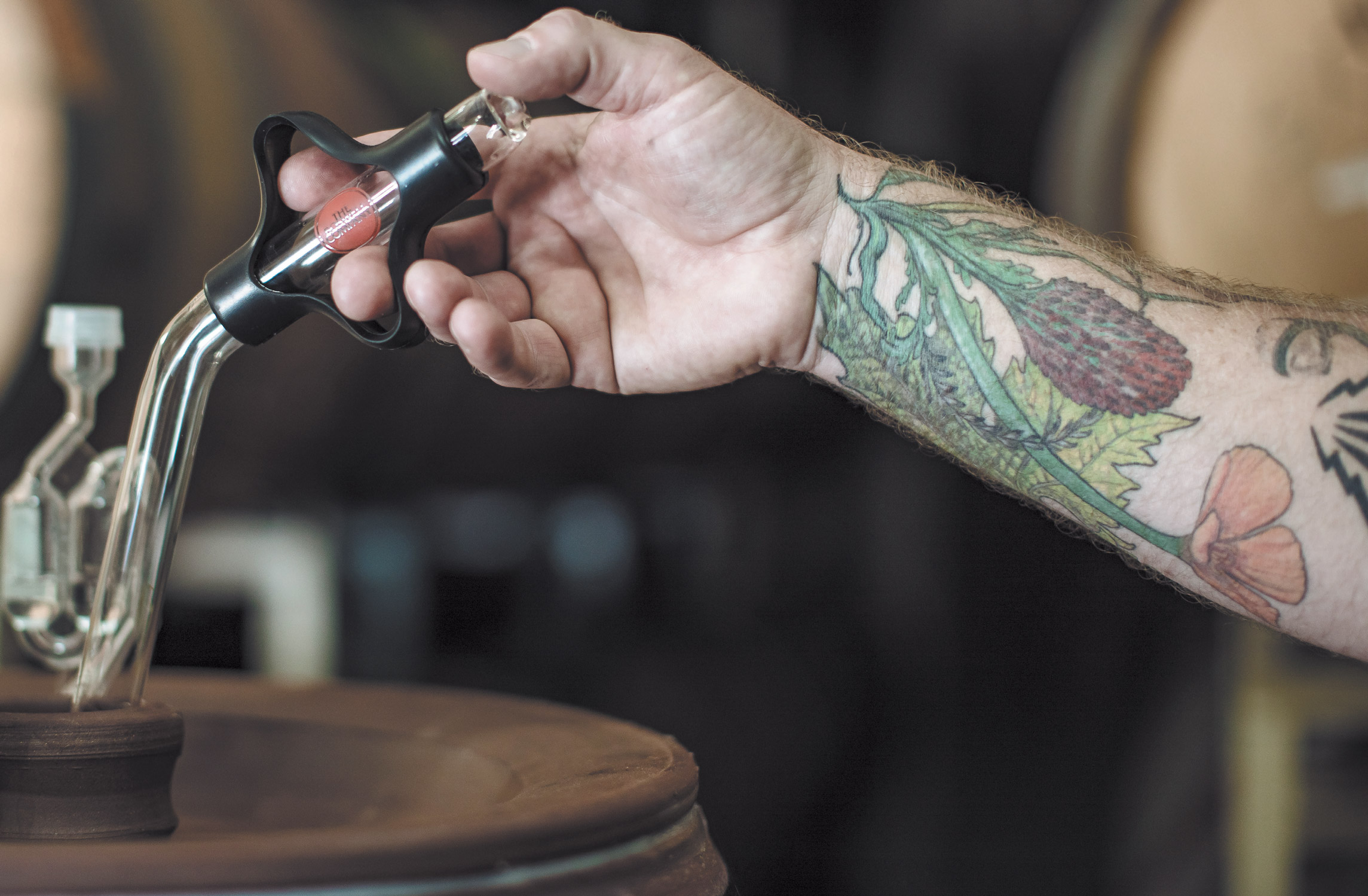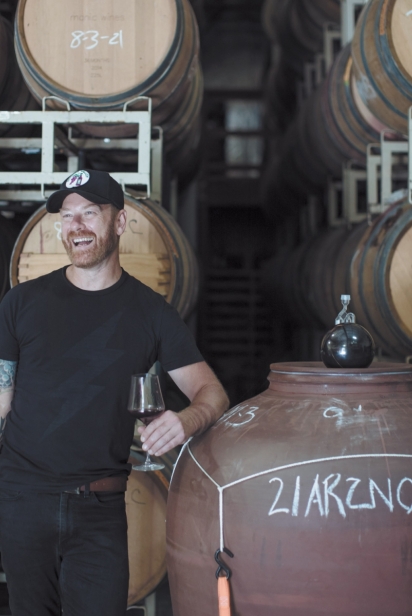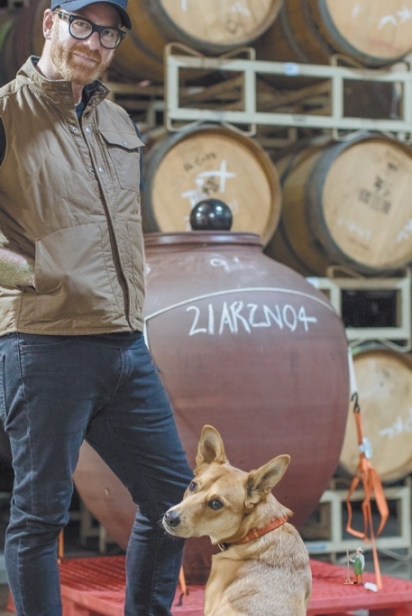Thinking Outside the Barrel
Jason Ruppert shatters the natural winemaking mold
Jason Ruppert leans forward comfortably, his heavily tattooed arms resting gently on the table in front of him, his short-sleeve T-shirt adorned in geometric patterns with no visible logo or brand. His ready smile and 5 o’clock shadow are natural complements to the winemaker’s warm laugh. Even via Zoom, it is palpable that his enthusiasm for the topic fuels his cadence, which increases steadily as the conversation progresses.
The topic? Winemaking. Natural winemaking, to be exact.
Natural winemaking isn’t a new idea; any kosher wine is likely to be “natural” by default, devoid of additives, though most natural wines are not kosher. Some say the natural-wine movement started in Beaujolais. Others think somewhere in Germany. Wherever the credit lies, natural wines are becoming increasingly popular, and Sebastopol-based Jason Ruppert is clearly excited to be a leader in the movement to alter the way consumers think about—and drink—fermented grape juice.
“To call it ‘boutique’ misses the mark,” says Ruppert casually. “It’s tiny. Independent. A labor of love.” Ruppert’s youthful nature belies a lengthy resume that includes a successful career as a sommelier before beginning his winemaking journey alongside such giants as Ted Lemon, Steve Matthiasson and Pax Mahle. At every stop along the way, Ruppert was learning, taking note, and in 2018 he seized the opportunity to start his own wine label, which he named Ardure.
The name came to him in a vision, he says. “I was sitting around with a friend and he threw out the idea of ‘ardor,’” recalls Ruppert. “I loved it. But I wasn’t ready, so I put it to the side. Then a few years later, I woke up dead out of a dream and the word A-R-D-U-R-E was flashing in front of me. I had no idea what it was so I got out of bed and looked it up. It’s from the 15th-century French, and it means ‘the heat of passion.’ It’s the flush you get in your cheeks and your body when you’re aroused. So I got out of bed, it was, like, 4 or 5 in the morning, and I registered the domain. I knew at that moment that I was about to embark upon my life’s work.”
Ruppert’s winemaking methods are not uncommon, but, rather, they are genuinely unique, even by the standards of the zealots and eccentrics who populate the natural-winemaking movement. Sourcing Zinfandel from Dry Creek and Chardonnay from Marin County, Ruppert is involved in every aspect of his wines, starting in the vineyard. Like so many of Wine Country’s grape growers, Ruppert’s endeavors begin with an earnest effort to ensure that no chemicals reach his vines or pollute the ground in which they’re rooted. But it doesn’t end there. In place of more traditional sprays and sulfurs, Ruppert uses turpines—essential oils derived from plants—to help bolster the grapes and make them less susceptible to disease.
In March of this year, Ruppert invited Virginia Samsel to assess the energetic flow of his vineyards using reiki, a Japanese form of energy healing. At Samsel’s suggestion, Ruppert placed blue calcite in strategic locations within the vineyard to help direct energy to places that might otherwise be more susceptible to weakness. On his Instagram feed, Ruppert posted about the addition to his vineyards, “This may seem pretty woo-woo to most, but this is exactly what Ardure Wines is all about.”
And it really is what Ardure Wines, and Ruppert, are all about: Ruppert walks the natural-wine walk in every way. Not long ago, Ruppert took a contract for two tons of Syrah from El Dorado County. After he had already crushed those grapes and was busy turning them into wine, Ruppert got word that the chemical Roundup had been used in the vineyard where the Syrah grapes had been farmed. “The wine was finished, and it was delicious, but I couldn’t use it,” he said sadly. In the end, he took a bath financially, but maintained his integrity in the process, ensuring that no wine released under the Ardure label failed to meet his own high standards.
But if winemaking begins in the vineyard, as is commonly stated, it certainly doesn’t end there, nor do the ways in which Ruppert distinguishes his winemaking process from the field. Ruppert makes most of his wines in a combination of locally made amphorae (the clay jars in which the ancient Greeks and Romans aged their wines) and neutral Stockinger oak barrels sourced from Austria. In the amphorae, crafted from local clays, Ruppert places large and beautiful crystals.
“I believe in the power of crystal, healing power,” he explains. “The Egyptians used to put rubies and gemstones in their goblets when drinking to increase the energy and potency.”
Each amphora contains one of each crystal he uses: labradorite, fluorite and rose quartz. Ruppert places them in the vessels himself, allowing the crystals—and any power they may possess—to be part of the fermentation process. And when he’s done? “I’ll take them out, clean them, then bury them in the ground until I need them again for the next vintage. Then I’ll dig them up on the full moon, recharge them and use them again.”
The results of all this labor, of this tremendous attention to the details, goes beyond being merely “natural” to something Ruppert refers to as “zero-zero” wine, by which he means simply that there is nothing added, and nothing removed. “Pure unadulterated fermented grape juice—and that’s it,” he says.
A glass of Ruppert’s wine rests on a table, fermented grape juice suspended in fine German crystal. The muddled straw-gold hue catches the sunlight and plays with it, refracting it back into the room. The wine is unfiltered and unfined, it is au naturel and thus it sacrifices clarity for the presence of particulates that make the wine appear hazy, not unlike some IPAs in the beer world. The aromas are intense—lemon zest, green apple, bosque pear, creamy brie, pineapple and more—and they waft through the room without the slightest provocation, eventually coming to rest upon the palate. To the casual imbiber, this particular glass might not seem to be dramatically different from any other glass of Chardonnay, but to those who know the lengths to which Ruppert went to craft it, this couldn’t be further from the truth. If you know, you know: These wines are magical.
To see a “pet nat” on a restaurant wine list or on the shelf of a fine-wine store these days is becoming increasingly common, but not all natural wines are created the same. The thought, care and creativity that goes into Ruppert’s labor of love certainly distinguish his Ardure wines from the field. As the natural-wine movement continues to gain momentum, Ruppert is poised to be one of its most outspoken advocates, and one of its most passionate leaders. That ready, confident smile flashes as we close our interview, “I’m good at what I do. I love what I do. And I wouldn’t have it any other way.”
Why Natural Wine?
From Marin-based Patagonia Provisions, which recently introduced a line of natural wines, sakes and ciders.
Natural wine embodies a return to the principles of ecological stewardship that guided viticulture for thousands of years before industrialization.
It starts with the idea of connection to place. Nothing captures the natural setting of a given location—the soil, weather, flora and fauna—like hand-crafted, thoughtfully produced wine. Thanks to low-intervention growing and processing techniques, natural wines can beautifully express the landscapes in which they’re grown—so each sip conveys the taste, aroma and spirit of some of the best places on earth. Natural wine grapes are grown with regenerative practices that restore rather than deplete local ecosystems.
Fermentation, aging and bottling are all done with minimal intervention to keep and enhance these natural flavors. That means no filtration and only the slightest amounts, if any, of added sulfites. Wild, indigenous yeasts come into play. Weather and seasons make an impact. Time changes and intensifies flavors.
Mirroring Patagonia Provisions’ overall ethos and commitment to responsible farming practices, each of our partner vintners and producers involved in the natural wine, sake and cider line is helping to restore their ecosystems by prioritizing soil health over synthetically stimulated yields.
Patagonia Provisions’ current seven natural beverage offerings range from a piquette wine that draws its refreshing, bubbly nature and low alcohol content from fermenting the remains of grapes crushed for other wines, to wines grown on the flanks of a Sicilian volcano, in the granite soil of an abandoned Catskills dairy farm, and ciders from the foothills of the Andes and the rolling hills of New Zealand’s South Island. There’s also an Austrian herb-infused white from one of the largest biodynamic farms on earth, and a classic Chablis from a historic vineyard that’s been in the winemaker’s family for more than 400 years. With each, there is delicious, unexpected flavor and a tangible connection to the place and person who made it—along with a passion that Patagonia Provisions aims to harness: to inspire greater emphasis on restorative farming practices and low-intervention winemaking across the wine industry.






